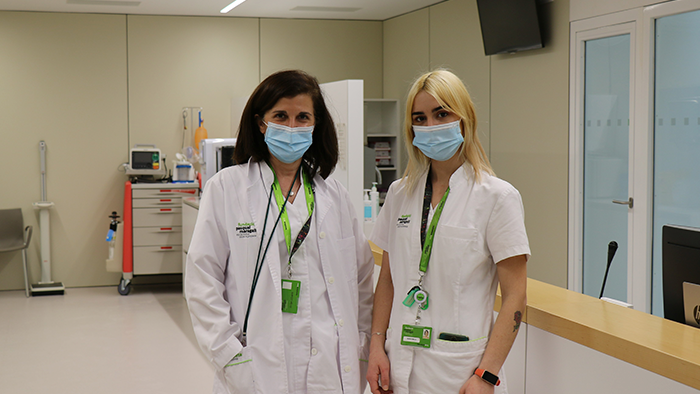06 Apr | 2022
The BBRC reaches 1,000 lumbar punctures in search for early detection of Alzheimer’s

Anaesthetist Olga Comps and nurse Maria Emilio, after performing a lumbar puncture
The Barcelonaβeta Brain Research Center (BBRC) has reached the figure of 1,000 lumbar punctures performed this year. This procedure allows researchers to decipher the biomarkers of Alzheimer's present in the cerebrospinal fluid by puncturing the fluid that surrounds the spinal cord. Thanks to this test, the BBRC can develop new ways to detect the preclinical phase of Alzheimer's and enrich the selection of participants for studies aimed at this asymptomatic stage of the disease.
The first lumbar puncture of the BBRC took place on September 26, 2016 within the framework of the ALFA+ study, which aims to describe the biological processes of Alzheimer's and identify risk factors that may precede the clinical phase. Since then, the Pasqual Maragall Foundation research center has carried out punctures for ALFA+, for the EPAD European collaborative research, completed in 2020 and dedicated to expanding knowledge about the preclinical stage of Alzheimer's; and for the BETA AARC study, underway since 2021 and focused on the early detection of biomarkers of the disease. Punctures have also been performed in the context of clinical trials such as ARACLON and EARLY.
It is worth mentioning in all these years the role of Dr. Fernando Escolano, former Head of the Anesthesiology and Rehabilitation Service of the Hospital del Mar, now retired. Dr. Escolano began his collaboration with the BBRC in 2012 and was responsible for designing the protocol that has been followed in our center to carry out lumbar punctures. This protocol stands out for defining a methodology that is a little longer than usual but safer and that avoids possible adverse effects, such as headaches, as much as possible. In addition, Dr. Escolano collaborated in the adaptation of the puncture rooms of the Foundation of the current building on Wellington Street in 2016 and he and his team of anesthesiologists have been in charge of carrying out the punctures during all these years. During all these years, Dr. Escolano has been an extraordinary professional, in addition to always showing a very close relationship and great humanity in his work.
Lumbar puncture not only allows advanced study of Alzheimer's disease, but also offers participants the opportunity to make decisions about the future autonomously, participate in clinical trials and receive follow-up based on the etiology of the disease. Over the last few years, lumbar puncture has become an increasingly common test in the field of research and clinical trials.









